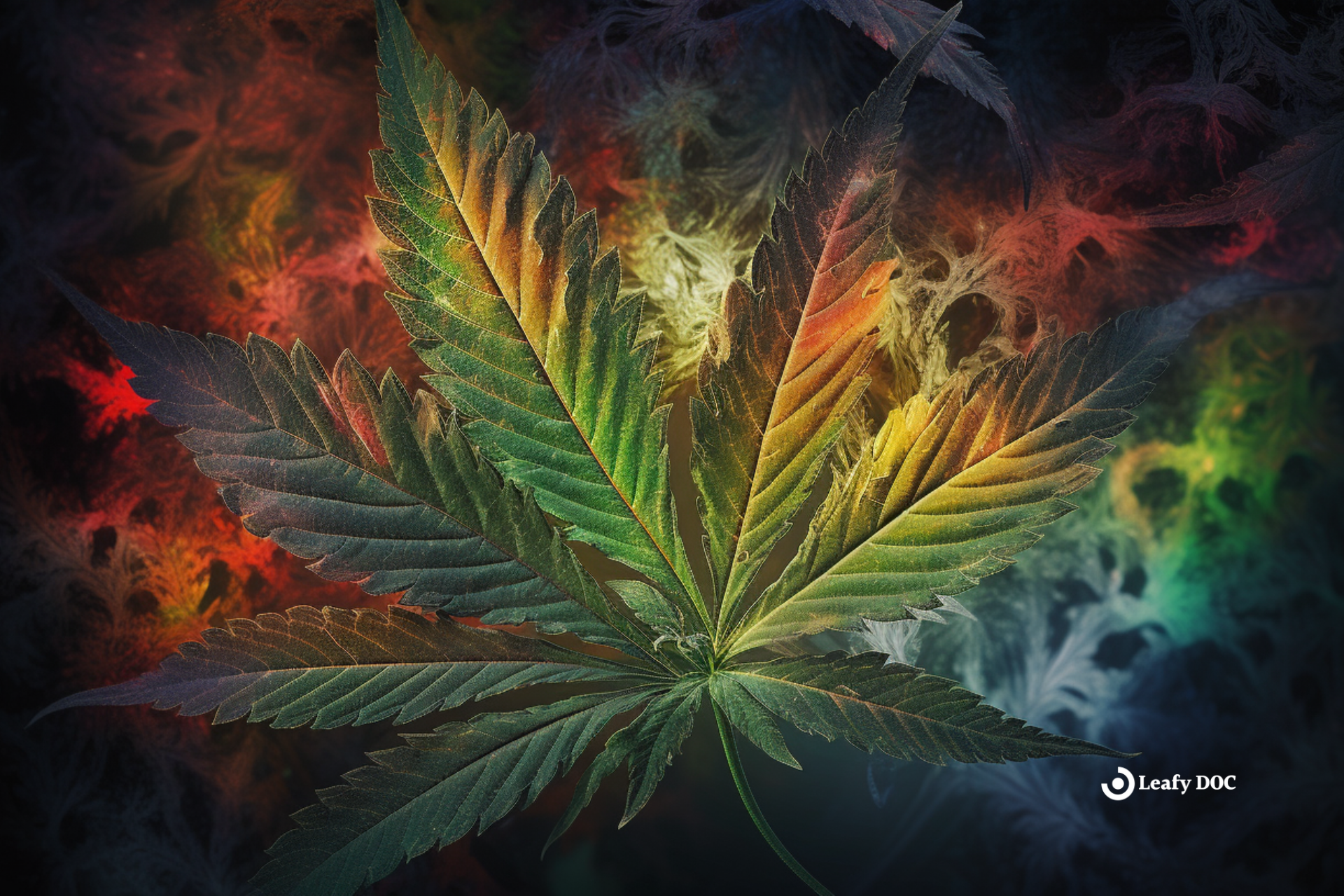Is Marijuana Considered A Psychedelic Drug?
by Haley Mills · October 6, 2023
Unveiling the Psychedelic Secrets of Weed: Is Marijuana Considered a Psychedelic Drug? Find out the mind-altering effects, potential benefits, and risks associated with this controversial drug. Click here to explore the truth now!

Marijuana, a widely debated substance, has long been associated with various psychoactive effects, but is it considered a psychedelic drug? To answer this question, it is crucial to understand the definition of psychedelic drugs and how marijuana is classified.
Psychedelic drugs are substances that alter perception, cognition, and mood, often leading to profound changes in consciousness. They are known for their hallucinogenic properties and ability to induce intense sensory experiences. With these characteristics in mind, it is essential to explore whether marijuana fits within this classification.
Marijuana, scientifically known as Cannabis sativa, is classified as a psychoactive drug due to its ability to alter brain function and produce various psychological effects. However, its classification as a psychedelic drug is a subject of ongoing debate and controversy.
While marijuana does have psychoactive properties, it does not typically induce the same level of hallucinations and sensory distortions as traditional psychedelic substances like LSD or psilocybin mushrooms. Nonetheless, some argue that marijuana can produce mild psychedelic experiences, especially at higher doses or when consumed in specific ways, such as through concentrated forms like edibles or oils.
To understand whether marijuana is considered a psychedelic drug, it is essential to examine its psychoactive effects, similarities to other psychedelic substances, and the ongoing scientific discourse surrounding its classification.
Key Takeaways
- Marijuana is classified as a psychedelic drug.
- Marijuana has medical benefits such as pain relief and reducing nausea and vomiting in cancer patients undergoing chemotherapy.
- Social implications are associated with marijuana use, including controversy and debates about legalization and regulation.
- Marijuana use is associated with positive and adverse outcomes, making it difficult to reach a consensus on its classification.
Definition of Psychedelic Drugs
Did you know that psychedelic drugs are substances that alter perception and cognition, such as LSD and psilocybin mushrooms?
These substances are known for their ability to induce powerful psychedelic experiences, characterized by profound alterations in sensory perception, thought patterns, and emotions.
The term “psychedelic” comes from the Greek words “psyche” meaning mind or soul, and “deloun” meaning to manifest or reveal.
Psychedelic drugs have a long history of use in various cultures for spiritual and ceremonial purposes. They have also been studied for their therapeutic potential in treating depression, anxiety, and PTSD. Research suggests that psychedelic experiences can lead to increased empathy, openness, and a sense of interconnectedness, which may have therapeutic benefits.
These substances have shown promise in clinical trials, with some studies indicating that they can help alleviate symptoms of mental health disorders when used in a controlled and supervised setting. However, more research is needed to fully understand the potential benefits and risks associated with their use.
Classification of Marijuana
When it comes to marijuana, you might be surprised to learn how it’s classified. Despite its reputation as a recreational drug, marijuana is actually considered a Schedule I controlled substance in the United States, along with drugs like heroin and LSD.
This means it’s classified as having a high potential for abuse and no accepted medical uses. However, some states have legalized marijuana for medical purposes, recognizing its potential benefits in treating certain conditions such as chronic pain, epilepsy, and multiple sclerosis.
The legal status of marijuana varies from country to country. In some places, it’s completely illegal, and possession can result in severe penalties. In other countries, it’s decriminalized or even legal for recreational use.
The medical use of marijuana is also gaining acceptance in many countries, with some allowing it for specific conditions and others implementing more comprehensive medical marijuana programs. However, even in places where marijuana is legal, strict regulations and restrictions are often in place to ensure its safe and responsible use.
Psychoactive Effects of Marijuana
Experience the mind-altering effects of marijuana as it enhances your perception and induces a sensory journey. Marijuana contains a psychoactive compound known as delta-9-tetrahydrocannabinol (THC), which interacts with the cannabinoid receptors in the brain, resulting in its psychoactive effects. These effects can vary depending on the strain of marijuana, the dosage, and the individual’s tolerance.
Common short-term psychoactive effects of marijuana include relaxation, euphoria, altered time perception, heightened sensory perception, and increased appetite. However, it’s important to note that marijuana is not classified as a psychedelic drug. Psychedelic drugs, such as LSD and psilocybin mushrooms, profoundly alter perception, cognition, and emotions.
While marijuana can induce some psychedelic-like effects, such as sensory enhancement and altered perception, it does not typically produce the intense hallucinations and ego-dissolution associated with classical psychedelics.
In terms of long-term effects, research on marijuana is still ongoing. Some studies suggest heavy and prolonged marijuana use may be associated with cognitive impairments, such as memory and attention problems. Additionally, evidence suggests that marijuana use, particularly during adolescence, may be associated with an increased risk of psychiatric disorders, such as schizophrenia. However, more research is needed to understand the long-term effects of marijuana use fully.
On the other hand, marijuana has shown promise in medicine. It has alleviated symptoms associated with various medical conditions, such as chronic pain, chemotherapy-induced nausea and vomiting, multiple sclerosis, and epilepsy. The therapeutic properties of marijuana are attributed to its active compounds, including THC and cannabidiol (CBD). These compounds interact with the body’s endocannabinoid system, which regulates pain, mood, appetite, and other physiological processes.
Similarities to Psychedelic Drugs
Although often associated with relaxation and euphoria, marijuana shares several characteristics with psychedelic substances. One of the main similarities is the psychoactive effects they both produce. Both marijuana and psychedelic drugs like LSD and psilocybin mushrooms alter perception, cognition, and mood by interacting with the brain’s cannabinoid receptors. This interaction leads to the release of neurotransmitters such as dopamine and serotonin, which are responsible for the altered state of consciousness experienced during the use of these substances.
Marijuana and psychedelics also share therapeutic uses. Both have shown potential in treating various mental health conditions, such as depression, anxiety, and PTSD. Research has shown that marijuana can help alleviate symptoms of these disorders by modulating the endocannabinoid system, which plays a crucial role in maintaining emotional stability. Similarly, psychedelics have been studied for their potential to induce profound and transformative experiences that can lead to long-lasting improvements in mental health.
Further research is needed to fully understand the long-term effects and potential risks associated with marijuana and psychedelic substances.
Debate and Controversy Surrounding Marijuana Classification
You may be surprised by the ongoing debate and controversy surrounding the classification of marijuana. While some argue that marijuana should be classified as a psychedelic drug due to its mind-altering effects, others believe it should be classified separately.
This debate is fueled by various factors, including the medical benefits of marijuana and its social implications. Regarding medical benefits, marijuana has been shown to have potential therapeutic uses for various conditions. For example, it is effective in reducing pain and inflammation, alleviating symptoms of epilepsy, and helping with nausea and vomiting in cancer patients undergoing chemotherapy. These medical benefits have led many to argue that marijuana should be classified as a medicine rather than a psychedelic drug.
The social implications of marijuana use cannot be ignored. The recreational use of marijuana has been a topic of controversy for decades, with proponents arguing for its legalization and regulation, and opponents expressing concerns about potential adverse effects on public health and safety. This debate has been further complicated because marijuana use has been associated with both positive and negative outcomes, making it difficult to reach a consensus on its classification.
In conclusion, the debate and controversy surrounding the classification of marijuana continue to be a topic of discussion. While some argue for its classification as a psychedelic drug, others believe it should be categorized separately. The medical benefits of marijuana and its social implications are factors in this ongoing debate, and further research is needed to understand its effects and potential uses fully.
In Conclusion
While marijuana does have some psychedelic-like effects, it’s not typically classified as a psychedelic drug.
Psychedelic drugs alter perception, cognition, and mood, often resulting in hallucinations and altered consciousness. While marijuana can produce mild hallucinogenic effects, such as heightened sensory perception and distortions in time and space, it’s primarily classified as a psychoactive drug.
The classification of marijuana has been debated and controversial for many years. Some argue that its psychedelic effects warrant its classification as a psychedelic drug. In contrast, others believe it should be classified as a separate category due to its unique chemical makeup and effects on the brain. Ultimately, classifying marijuana as a psychedelic drug is subjective and may vary depending on individual perspectives and scientific research findings.
Last Updated: August 8, 2024
Get Approved for Your Medical Marijuana Card in Minutes!

Get Your Medical Card
Connect with a licensed physician online in minutes

Like This Article?
Share with your friends
Table of Contents
Keep Reading
-
Relieving Stress With Cannabis Topicals
Relax and unwind with cannabis topicals for stress relief. Say goodbye to anxiety and discover the ultimate relaxation method. Click now to find out how cannabis topicals can help you achieve tranquility.
-
Top 7 Cannabis Strains For Sex
Spice up your love life with the best weed strains for sex. Uncover the top 7 cannabis strains that will elevate your intimate experiences to new heights. Click now and unlock a world of pleasure!
-
5 People Who Might Find Relief With Cannabis-Infused Lotions
Are you looking for natural relief? Learn how cannabis-infused lotions can help alleviate chronic pain and anxiety in 5 different individuals. Click here to discover more!



